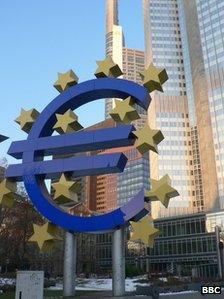British banks borrow £31bn from ECB
- Published
- comments

Four of the big UK banks took out cheap loans from the ECB
The European Central Bank thought it was rescuing the eurozone's banks by providing them with more than a trillion euros of cheap three-year loans, at a time when they were finding it dangerously difficult to borrow.
So why is it that the UK's four biggest banks have taken considerable advantage of the money on offer, borrowing €37.4bn or £31bn between them from the ECB?
It is a colossal sum - and it is remarkable for two reasons:
1) the UK's banks are supposed to be stronger than those in the eurozone, and therefore less in need of such support, and
2) successive British governments have made no secret of their pleasure at being outside the currency union.
However all these banks, Barclays, Lloyds, HSBC and RBS, have substantial operations inside the eurozone, and feel it is legitimate to fund their eurozone banks or eurozone loans with money borrowed from the European Central Bank.
Barclays, for example, said today it had borrowed €8.2bn earlier this week, primarily to finance a bank it owns in Spain and another one in Portugal (it borrowed nothing in the first auction of such loans, in December).
As for Lloyds, it has borrowed the most of the British banks, €13.6bn, to finance so-called non-core assets, or loans it is running down in Ireland, the Netherlands and Spain (and again borrowed it all this week, with none taken in December).
HSBC, widely perceived to be the strongest of the UK's banks and one of the strongest in the world, borrowed €5.6bn from the ECB, most of it in the first auction in December. And RBS has borrowed €10bn, split 50:50 between the two auctions.
The reason it may be controversial that British banks have borrowed so much from the ECB - a bit less than 4% of all the money on offer - is that the interest rate is so low, just 1%. So arguably eurozone taxpayers are subsidising UK financial institutions.
That may explain why Barclays felt compelled today to say that the money would be ring-fenced, and that no bonus would be paid from any windfall it earns out of the ECB's money.